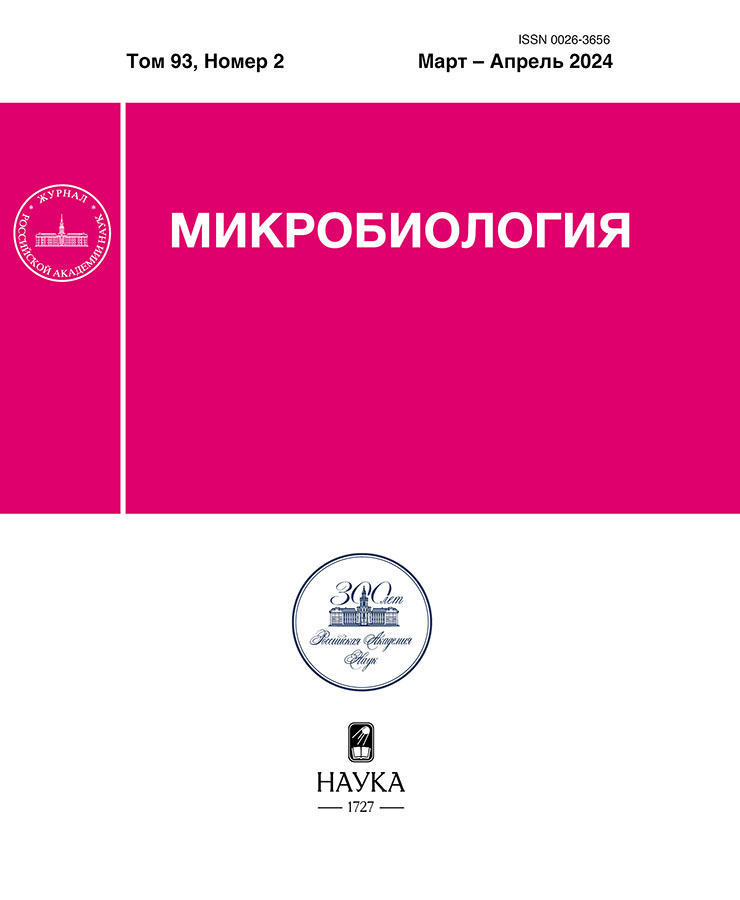Effect of O-Polysaccharide Modifications on Successful Plant Colonization by Bacteria
- Authors: Burygin G.L.1,2,3, Khanina A.A.3, Filippova M.V.3
-
Affiliations:
- Institute of Biochemistry and Physiology of Plants and Microorganisms, Saratov Scientific Centre of the Russian Academy of Sciences
- Saratov State University
- Saratov State University of Genetics, Biotechnology, and Engineering named after N.I. Vavilov
- Issue: Vol 93, No 2 (2024)
- Pages: 173-178
- Section: SHORT COMMUNICATIONS
- URL: https://jdigitaldiagnostics.com/0026-3656/article/view/655131
- DOI: https://doi.org/10.31857/S0026365624020148
- ID: 655131
Cite item
Abstract
O-polysaccharides of gram-negative bacteria are a highly variable component of the lipopolysaccharide molecules located at the cell wall surface and involved in microbial interaction with plant and animal cells. Activity of prophage genes often results in various non-stoichiometric modifications (methylation, acetylation, etc.) of glycans at bacterial cell surface. The share of modified O-polysaccharides increases during the stationary growth phase and results in increased hydrophobicity of microbial surface. Bacterial cells with different hydrophobicity showed difference in attachment to plant roots. Increased cell hydrophobicity index was found to result in a significant increase in the number of adsorbed microorganisms per unit root length. Thus, acetyl transferase and methyl transferase genes of viral origin may be indirectly involved in successful colonization of plant roots by rhizosphere bacteria.
Full Text
About the authors
G. L. Burygin
Institute of Biochemistry and Physiology of Plants and Microorganisms, Saratov Scientific Centre of the Russian Academy of Sciences; Saratov State University; Saratov State University of Genetics, Biotechnology, and Engineering named after N.I. Vavilov
Author for correspondence.
Email: burygingl@gmail.com
Russian Federation, Saratov, 410049; Saratov, 410012; Saratov, 410012
A. A. Khanina
Saratov State University of Genetics, Biotechnology, and Engineering named after N.I. Vavilov
Email: burygingl@gmail.com
Russian Federation, Saratov, 410012
M. V. Filippova
Saratov State University of Genetics, Biotechnology, and Engineering named after N.I. Vavilov
Email: burygingl@gmail.com
Russian Federation, Saratov, 410012
References
- Матора Л.Ю., Серебренникова О.Б., Петрова Л.П., Бурыгин Г.Л., Щеголев С.Ю. Нетипичный характер R-S диссоциации Azospirillum brasilense // Микробиология. 2003. Т. 72. С. 60–63.
- Matora L.Y., Serebrennikova O.B., Petrova L.P., Burygin G.L., Shchegolev S.Y. Atypical R–S dissociation in Azospirillum brasilense // Microbiology (Moscow). 2003. V. 72. P. 48–51.
- Alexander C., Rietschel E.T. Invited review: Bacterial lipopolysaccharides and innate immunity // J. Endotoxin Res. 2001. V. 7. P. 167–202.
- Choi J., Kotay S.M., Goel R. Various physico-chemical stress factors cause prophage induction in Nitrosospira multiformis 25196-an ammonia oxidizing bacteria // Water Res. 2010. V. 44. P. 4550–4558.
- Fedonenko Y.P., Sigida E.N., Konnova S.A., Ignatov V.V. Structure and serology of O-antigens of nitrogen-fixing rhizobacteria of the genus Azospirillum // Russ. Chem. Bull. 2015. V. 64. P. 1024–1031.
- Krepsky N., Ferreira R.B.R., Nunes A.P.F., Lins U.G.C., e Silva Filho F.C., de Mattos-Guaraldi A.L., Netto-dosSantos K.R. Cell surface hydrophobicity and slime production of Staphylococcus epidermidis Brazilian isolates // Curr. Microbiol. 2003. V. 46. P. 280–286.
- Lerouge I., Vanderleyden J. O-antigen structural variation: mechanisms and possible roles in animal/plant–microbe interactions // FEMS Microbiol. Rev. 2002. V. 26. P. 17–47.
- Roy K., Ghosh D., DeBruyn J.M., Dasgupta T., Wommack K.E., Liang X., Wagner R.E., Radosevich M. Temporal dynamics of soil virus and bacterial populations in agricultural and early plant successional soils // Front. Microbiol. 2020. V. 11. Art. 1494.
- Sigida E.N., Fedonenko Y.P., Shashkov A.S., Zdorovenko E.L., Konnova S.A., Ignatov V.V., Knirel Y.A. Structural studies of the O-specific polysaccharide(s) from the lipopolysaccharide of Azospirillum brasilense type strain Sp7 // Carbohydr. Res. 2013. V. 380. P. 76–80.
- Sigida E.N., Kargapolova K.Y., Shashkov A.S., Zdorovenko E.L., Ponomaryova T.S., Meshcheryakova A.A., Tkachenko O.V., Burygin G.L., Knirel Y.A. Structure, gene cluster of the O-antigen and biological activity of the lipopolysaccharide from the rhizospheric bacterium Ochrobactrum cytisi IPA7.2 // Int. J. Biol. Macromol. 2020. V. 154. P. 1375–1381.
- Teh M.Y., Furevi A., Widmalm G., Morona R. Influence of Shigella flexneri 2a O-antigen acetylation on its bacteriophage Sf6 receptor activity and bacterial interaction with human cells // J. Bacteriol. 2020. V. 202. Art. e00363-20.
- Tkachenko O.V., Evseeva N.V., Boikova N.V., Matora L.Y., Burygin G.L., Lobachev Y.V., Shchyogolev S.Y. Improved potato microclonal reproduction with the plant-growth promoting rhizobacteria Azospirillum // Agron. Sustain. Develop. 2015. V. 35. P. 1167–1174.
- Vanacore A., Vitiello G., Wanke A., Cavasso D., Clifton L.A., Mahdi L., Campanero-Rhodes M.A., Solís D., Wuhrer M., Nicolardi S., Molinaro A. Lipopolysaccharide O-antigen molecular and supramolecular modifications of plant root microbiota are pivotal for host recognition // Carbohydr. Polym. 2022. V. 277. Art. 118839.
Supplementary files











